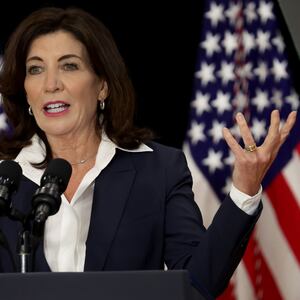I have no idea if Salvador Ramos, the 18-year-old gunman who murdered at least nineteen students and two teachers on Tuesday, suffered from a mental illness. But I know I reject the certainty that Ramos didn’t have such an illness, which many have already expressed. This is perhaps epitomized by Media Matters for America’s Matt Gertz calling mental health talk a “cynical dodge.” This reflexive insistence that mental illness was not at play is wrong, and potentially destructive.
In the immediate aftermath of these tragedies, everyone scrambles to take their partisan places. The by-now familiar habit is to rush to discover the shooter’s race and religion, the better to fit the story into a trite political narrative. For example, if the killer is white, then liberals can shout about white supremacy; if Muslim, then conservatives can rant about radical Islam. Ramos, inconveniently for knee-jerk political tribalists, was Hispanic, and thus does not so easily fit into these prefabricated arguments.
But when a major national story explodes online, you can be sure that people will quickly find some battlements to man and some culture war to wage. Mental health has quickly become such a battleground—in particular, concerning the certitude held by some over what mental illness supposedly can’t do.
As has happened with every major mass shooting in the past several years, many left-leaning people have rushed to deny that mental health had anything to do with it. “Mental illness” trended on Twitter, with a vast majority of the tweets I’ve seen explicitly avowing that this shooting could never have been the product of insanity.
In an essay considering the link between mental health and mass shootings, Quentin Fottrell of Marketwatch echoed a common sentiment, saying, “Bluntly linking mental health to gun violence can stigmatize the former.” Democratic Sen. Chris Murphy of Connecticut was more direct and less equivocal. “Spare me the bullshit of mental illness,” said Sen. Murphy, echoing a fair swath of liberal opinion. “We’re not an outlier on mental illness, we’re an outlier on firearms.”
It’s quite correct to place the focus on gun control, as Murphy does, but it’s not entirely accurate to say that the United States is not an outlier in mental illness—we have some of the highest rates in the world in almost any identifiable disorder. More importantly, our relative rates of mental illness can say nothing about whether any individual was so afflicted.
With luck, information will come out about Ramos’s history that will help us understand his mental state. Either way, whether he was mentally disordered or not is a question of fact, and the answer cannot be found through appeal to first principles. I’m afraid that attitude has been consistently rejected in progressive spaces, though, typically expressed with a bromide that I hear more and more often these days—“mental illness can’t do that”—in response to any bad act committed by someone whose sanity might be questioned.
But I’m afraid mental illness can do that.
For mass shootings, we have a fairly recent example in James Holmes, who shot up a movie theater in Aurora, Colorado almost exactly a decade ago. Armed with an assault rifle, Holmes wounded 70 people and killed 12.
It was later revealed that as a grad student at the University of Colorado, Holmes had been flagged by both students and staff as suffering from mental illness and potentially dangerous. In fact, Holmes had gone so far as to call a mental health hotline before his attack, seeking help, but said he was disconnected after only nine seconds. But Holmes was never involuntarily committed or otherwise compelled to receive treatment, which is common; despite constant claims in our culture that it’s too easy for people to be pulled into the mental healthcare system against their will, the reality is often quite the opposite, with doctors and institutions lacking the tools to force badly ill patients into treatment.
In hindsight it became clear that Holmes was suffering from a textbook case of schizophrenia, developing classic symptoms at precisely the age in life when that diagnosis is most common. His paranoia, delusions of grandeur, and increasingly loose hold on reality all perfectly matched the established etiology of the disorder. Multiple psychiatrists who interviewed him after the shooting identified him as schizophrenic.
And while his act of violence was unusually spectacular, the fact that he acted violently was not. “Disability advocates” have taken to insisting that the mentally ill bear no threat to anyone, but in fact there are and have always been some patients whose disorders inspire them to act violently. The media image of the violently psychotic patient does not come from nowhere. Unfortunately, activists have worked to obscure this simple reality for years, typically with misleading factoids such as that the mentally ill are more likely to be the victims of violence than the perpetrators—which says nothing about the relative rate at which they offend. This resource from the Treatment Advocacy Center is typical in that the studies aggregated clearly show that there is a significant minority of mentally ill patients who act violently, but the summary at the top dances around that fact.
Holmes’ not guilty by reason of insanity plea was rejected by the jury, who found him guilty of hundreds of counts of murder and attempted murder, ensuring he would spend the rest of his life in a maximum-security prison rather than in a mental health facility. (It’s worth noting that even had he been found not guilty by reason of insanity he almost certainly would never have walked free again.) Prosecutors pushed for the death penalty, but Holmes’ life was spared by a single juror, who said explicitly that they were not willing to sentence someone who was obviously deeply mentally ill to death.
I often think of that juror when people insist “mental illness doesn’t do that.” If they’re right, then James Holmes should have been executed, and all manner of other patients who have committed violent crimes should be receiving punishment instead of treatment.
Perhaps people are so invested in the idea that mental illness could not be at play in the Uvalde, Texas, shooting because they simply want to keep the focus on gun control, where (I agree) it belongs.
An uglier potential reason is that these people support the mentally ill only as far as they can maintain a vision of them as entirely pure and blameless; their antipathy to “ableism” extends only so far as they are never put into a position where they must sympathize with people who have committed heinous acts. But this is no support at all.
If progressive mores only dictate respect for those who struggle with their mental health when they are inert and unthreatening, then that “respect” is a farce. I have watched with increasing frustration as the narrative that those who become violent must therefore not be mentally ill has spread among progressives. It’s a cartoonishly childish stance, the most facile and shallow form of moral support, a caricature of liberal regard for the voiceless. It’s the schizophrenic who cannot stop hurting themselves and others who need your support the most.
What the insistence that mass shootings can never be the product of mental illness shows me, more than anything, is the contemporary addiction to moral simplicity. If Ramos did indeed suffer from a psychiatric disorder then that would not in any sense absolve him of responsibility for what he did. But it would complicate the moral dimensions of the act, compel us to consider mitigating circumstances, suggest that he was perhaps deserving of sympathy as well as condemnation. And in 2022, in a society that’s obviously broken and seemingly impervious to positive change, all people feel they can hold on to is their judgment, their searing and perfect moral righteousness—“mental illness doesn’t do that.”
It’s almost unthinkable that we will actually reform our terrible gun laws in response to this incident, and so liberals cling even tighter to their right to exist in a simplistic, black-and-white moral world; their judgements are all that they have.
But the world’s complexity continues to assert itself, and these simplistic fables about crime and violence can only do harm.







